Health Sharing Programs are emerging as one of the most effective and flexible alternatives to health insurance. In this updated side-by-side healthshare plans comparison guide, we rate and review the best and most affordable options that are currently available.
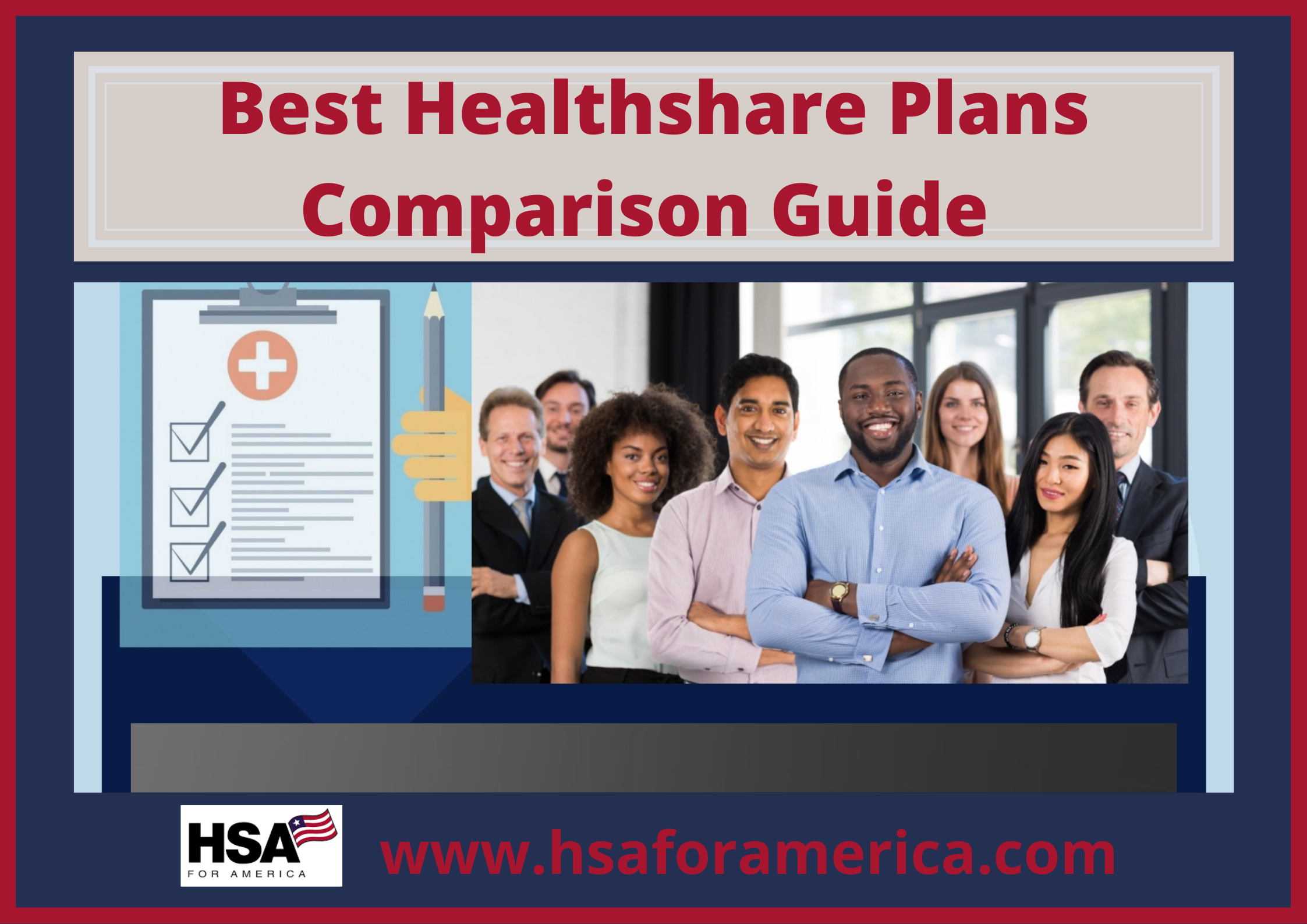
What Are the Best Health Sharing Plans in America?
We’ve reviewed some of the most affordable and popular options out there, including Altrua, DPC Direct, HSA Secure, Medi-Share, netWell Healthshare, JHS Community, Liberty, OneShare Health, Prosper, Sedra, Samaritan, Universal Healthshare, and United Refuah. These are the plans that our clients love and our healthshare experts recommend.
Stick with us till the end, and we’ll share our top pick for the most budget-friendly alternative to health insurance.
Compare Pricing on the Best HealthShare Plans Available
Health Sharing Plans Comparison [2024 Update]
Note: The contribution amounts have been updated for 2024. These amounts reflect the price for individual plans, and can vary depending on how you structure your plans. Adding family members to your healthshare plan will also increase the monthly cost.
Best Overall Healthshare Plan: netWell Healthshare
Membership levels:
Advantage is the catastrophic option, with a monthly contribution cost of $195 per month. This tier provides protection for ER visits, hospitalization, in/outpatient surgery, and lab costs.
Superior offers primary care protection, without the ER and hospitalization. This tier does not include sharing for catastrophic health care events, but it does provide outstanding access to primary care at an affordable price. However, participants in this membership tier should arrange for some protection from catastrophic health care costs from some other source, or consider Advantage or Elite + tiers.
Elite + is the most popular plan, offering full-spectrum sharing for both primary care and emergency care, subject to a member contribution amount –– which you can select. The plan offers a $2,500, $5,000, and a $10,000 option.
Pre-Existing Conditions: 24 month waiting period for pre-existing conditions. Certain more serious conditions may have a 2-year or 4-year waiting period, or a lifetime exclusion on related hospitalizations and surgeries.
Contribution Amounts [Individual]: $144 – $269
Provider Networks: Choose any doctor you wish. Discounts are available with netWell’s exclusive provider network.
Statement of Faith: Members must sign a Statement of Religious and Ethical Beliefs including belief in God, the Bible, the Power of Prayer, and the moral responsibility to share each other’s burdens.
HSA Option: Not available
Perks: The Elite + membership comes with a large suite of discount services, including dental, vision and LASIK, diabetic supplies, gym memberships, and lots more.

Best HSA-Qualified Plan: HSA Secure
HSA Secure’s offering includes all of the preventive benefits required under the Affordable Care Act through an HSA-qualified preventive-care “MEC” (minimum essential coverage) health insurance component, while the healthshare component is there to protect you from the larger expenses.
Thus, members eligible to contribute money to a Health Savings Account (HSA), enabling the to lower their taxes while building a fund to cover future medical expenses. HSA Secure also lets members use whatever health provider they want while not paying as much as they would with an unsubsidized traditional health insurance plan under the ACA.
Pre-Existing Conditions: Accepted
Contribution Amounts [Individual]: $170 – $295
Provider Networks: Any doctor or hospital
Statement of Faith: Not required
HSA Option: YES
Perks: Only healthshare available with HSA compatibility. Alternative treatments may be shared.
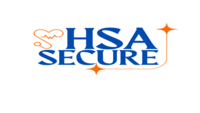
Best Low-cost Catastrophic Plan: JHS Community
The Jericho Health Share plan is designed to focus strictly on catastrophic care needs.
With its low, affordable monthly contribution levels and its powerful sharing capacity, Jericho Health Share arguably represents the best value in the health share industry for those who want a catastrophic-only solution.
This plan works best for those who are in good health, who don’t expect to need to consume much healthcare, and can afford to pay up to $10,000 to $15,000 per year if the need does arise.
This particular offering would not be a good match if you want a low member responsibility amount (which functions similarly to a health insurance deductible), and a more comprehensive health sharing plan.
Membership tiers: DISTINCT, DIVERSE, and DYNAMIC
Member Responsibility Amount: Choose from $2,500, $5,000, and $10,000 per member. MRA amount is capped at 3 members, making Jericho an attractive choice for those with large families. Your MRA does not increase with additional children.
Membership tiers:
- DISTINCT – Shares 50% of the next $10,000 after you meet your MRA, then shares 100% of costs for the rest of the year.
- DIVERSE – Shares 80% of the next $10,000 after you meet your MRA, then %100% of costs for the rest of the year.
- DYNAMIC – Pays 100% after you meet your MRA, with no additional co-sharing on your part.
Emergency Room Visits: $400 co-sharing per visit
Surgery and hospitalization: 90-day waiting period (other than for accidental injuries)
Maternity benefits: Shares up to $8,000 for DIVERSE and $12,000 for DYNAMIC for single and multiple births. These tiers also share up to $40,000 in the event of life-threatening complications for the mother, subject to MRA and additional MRA (co-sharing) amounts.
The DISTINCT tier does not include maternity benefits.
Maximum annual sharing limit:
- DISTINCT – $250,000
- DIVERSE – $750,000
- DYNAMIC – $1 million
Maximum lifetime sharing limit:
- DISTINCT – $1 million
- DIVERSE – $2 million
- DYNAMIC – $3 million

Altrua Healthshare
Contribution Amounts [Individual]: $113 – $297
Statement of Faith: Must sign a statement of standards
HSA Option: None
Perks: Unlimited telemedicine and 6 pooled doctor office visits per member [all membership levels].
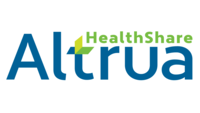
DPC Direct
The DPC practice handles routine primary care services traditionally done by your family doctor in his or her office. DPC Direct doesn’t duplicate the services included in your DPC membership. That would add cost without adding much value.
Instead, DPC Direct’s sharing benefits pick up right where your DPC doctor’s services leave off:
- ER/trauma services
- hospitalization costs
- specialist care
- surgeries
- imaging and lab services
- childbirth and neonatal costs… and more.
Because DPC Direct dovetails so well with DPC memberships, cost redundancies are avoided.
Combining a DPC membership with DPC Direct health sharing is therefore one of the most cost-efficient ways to handle the full spectrum of care, from primary care all the way through catastrophic medical events.
Initial Unshareable Amounts: Members can choose IUA amounts of $1,000, $2,500, and $5,000.
Pre Existing Conditions: 2-year lookback period is one of the more favorable ones in the health sharing industry. Waiting periods may apply to preexisting condition costs as follows:
- Months 1-12 – Not eligible for sharing.
- Months 13-23 – eligible up to $25,000
- Months 24-36 – eligible up to $50,000
- Months 36+ – eligible up to $125,000
Statement of Faith: DPC Direct is a completely secular plan. There is no requirement to belong to any specific religious community or adhere to any faith doctrine. Membership is open to all medically qualified applicants.
Care Network: None. Members can use their benefits with any doctor or provider.
Prescription Drugs: Optional access to the RX Share prescription discount program. Generic prescriptions as low as $5.
Mental Health Benefits: Access to Member Assistance program provides resources for counseling, grief, depression, and anxiety. The program also includes resources for elder care and elder financial counseling, parenting support, and teen counseling services.
Maternity benefits: Membership must start prior to conception date.
Alternative Medicine Benefits: Access to a Network of Healthy Living Choices with more than 35,000 providers, discounts & more than 35 complementary & alternative medicine specialties,
Smokers: Accepted, with $50/month surcharge. Sharing benefits are capped at $50,000 for COPD, cancer, heart conditions, and strokes.
Maximum Sharing Amount: None.
Member contributions: Plans start at $190 per month, depending on age and sex.

Liberty
Liberty has been one of the more popular health sharing programs. However, in recent years they have been slow to pay claims, there have been accusations of mis-management, and legal actions taken against them. We recommend that you proceed with caution.
Pre-Existing Conditions: Yes; limited to three (3) years of assistance
Contribution Amounts [Individual]: $159 – $359
Provider Networks: PHCS
Statement of Faith: Must agree to a set of 5 core values
HSA Option: NONE
Perks: Discounts on pharmacy, vision, hearing, and chiropractic costs

Medi-Share / MediShare
MediShare is the most explicitly Christian healthshare program available.
They have a strongly worded faith statement, and reserve the right to check with your minister to make sure you regularly attend church.
They also have some of the highest member reviews and boast a 98% customer satisfaction rate year after year. Medi-Share’s 25 year track record makes them one of the most reliable healthcare sharing options available.
Pre-Existing Conditions: Considered, but not guaranteed to be accepted
Contribution Amounts [Individual]: $135 – $470
Provider Networks: PHCS network
Statement of Faith: Must sign (and possibly have verified) a statement of faith
HSA Option: NONE
Perks: Telemedicine; dental, vision and RX savings. A 98% customer satisfaction rate

OneShare Health
The OneShare Catastrophic is a less expensive option designed for major expenses, and does not include doctor visits. OneShare Catastrophic” is popular because it offers both ER and Hospital Care, in addition to a great telemedicine program that includes mental health support. This plan may be a good choice when paired with a Direct Primary Care plan that handles primary, routine, and preventive care.
Pre-Existing Conditions: Some limitations
Contribution Amounts [Individual]: $115 – $239
Provider Networks: Uses Multiplan/PHCS Network
Statement of Faith: Must sign a ‘light’ statement of faith
HSA Option: NONE
Perks: Dental discount; diabetic care and supplies; lab discount, telemedicine w/ mental health services
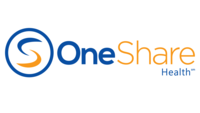
Prosper
The Prosper health sharing plan was developed by Universal Healthshare, a faith-based but non-denominational health sharing ministry founded on the tenets of Unitarian Universalism.
It’s a great match if you want to be a member of a faith-based health sharing community, but you don’t want to be required to attend religious services or adhere to any particular church or denomination.
We like Prosper’s relatively short three-year waiting period before costs to treat pre-existing conditions become fully shareable. Prosper begins phasing in sharing benefits for pre-existing conditions as soon as 12-months after you become a sharing member.
That’s among the most favorable waiting periods in the health sharing industry.
Prosper is also one of the few health sharing plans that will take on smokers, albeit as provisional members.
Pre-existing conditions: a 1-to-3-year phased-in waiting period.
Prosper also has a review process for pre-existing conditions: if you can show that your condition hasn’t been treated nor required treatment, and there’s no anticipated or prescribed need for future treatment, there are no harmful symptoms, and no deterioration of your condition for four years prior to enrolling, Prosper may waive the waiting period, and treat your condition as non-pre existing.
MRA Options: $5,000 to $10,000 per household member.
Maternity Sharing Limits:
- $5,000 for normal delivery or a c-section that is not medically necessary.
- $8,000 for a medically necessary c-section.
- $50,000 for combined expenses for the member and newborn arising from complications.
- Nine prenatal care visits per pregnancy, eligible for sharing 90 days after sharing program membership begins.
Network: None for hospitals and ambulatory surgical centers; Multiplan PHCS for individual doctors, including over 700,000 providers nationwide.
Sharing limit: $1 million per year.
HSA Compatible: Yes, when combined with HSA MEC.
Not available in: Alaska, Connecticut, Hawaii, Illinois, Iowa, Maine, Maryland, New Hampshire, Pennsylvania, Vermont, or the State of Washington.
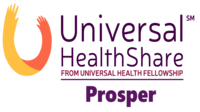
Samaritan
Individuals who attend church regularly should consider Samaritan. They can boast over 64,000 member households, which adds up to about $23 million per month that is eligible for sharing.
Pre-Existing Conditions: Not eligible for regular sharing
Contribution Amounts [Individual]: $200 – $495
Provider Networks: PHCS
Statement of Faith: Strict; must attend church regularly
HSA Option: Unknown
Perks: $250,000 maternity limit; 120-day supply of medication is shareable

Sedera Health
Expenses related to pre-existing conditions are fully shareable after 36 months of membership, which is among the most favorable in the health sharing industry.
Provider Networks: No provider network restrictions, and no out-of-network penalties.
Statement of Faith: Secular. There is no religious component to Sedera’s Statement of Ethics and Principles.
Lifetime maximum: There is no annual maximum dollar amount or lifetime maximum limits per Member, though certain dollar amounts and/or visit limits apply to specific types of medical care and therapies. Sharing is only limited by the amount available for sharing by the Community.
HSA Option: Not available.
Maternity Benefits:
SELECT+ (available to groups only) will share maternity if the pregnancy begins after their 1st day of membership. Subject to their IUA x2.
ACCESS+ will share maternity ONLY when the “expected due date” is at least 1 year after the membership start date. Subject to a $5,000 IUA.
Perks:
- Group/business plan fully supports list billing.
- Telehealth services for basic healthcare needs.
- Expert second opinions.
- Wellness support.
- Educational resources.
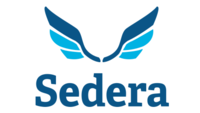
United Refuah Healthshare
The first Jewish Health Sharing Organization, established with a mission to provide affordable, flexible reimbursement options with Torah values. United Refuah has a more limited program selection than other health sharing companies, but also offers lower average contribution rates.
Pre-Existing Conditions: Eligible after 1 year of membership, with a $25,000 share cap in years 2 and 3.
Contribution Amounts [Individual]: $209 ($199 with direct bank debit program)
Provider Networks: Open (No network limitations)
Statement of Faith: Strict; must attend synagogue regularly
HSA Option: NONE
Perks: Open-network means you can choose any doctor or hospital; 24/7 tele-medicine practitioners are not subject to PreShare amounts

Universal Healthshare
One of the newer healthcare sharing companies, Universal Healthshare has seven different cost sharing programs to choose from. All Universal Healthshare programs include unlimited 24-hour telemedicine consultations, all with $0 fees.
Member Non-Shareable Amounts (NSA) can be as low as $1000 for an individual. This makes Universal Healthshare a good choice for someone who wants to be protected against steep out-of-pocket costs in case of an incident.
Pre-Existing Conditions: One year waiting period, $50,00 sharing cap during years 2 and 3
Contribution Amounts [Individual]: Starting at $186 per month
Provider Networks: Non-emergency visits must be scheduled through Multiplan / PHCS network
Statement of Faith: Statement of Shared Faith and Principles including belief in spiritual growth, peace, compassion, and community building
HSA Option: None
Perks: UHS Smart Share is a uniquely structured healthshare that sets fixed-rate sharing limits on specific medical events. This allows for an even lower monthly cost for members.
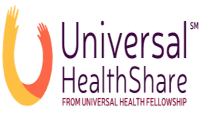
Schedule a free appointment with one of our Personal Benefit Managers
Top Healthshare Plans FAQ – Frequently Asked Questions About Healthcare Cost Sharing, HCSMs, and More
Q: What is a Health Sharing Program?
A:Health sharing, also known as medical cost sharing, is an alternative to traditional health insurance. Members of healthshares agree to share their medical expenses, and they each contribute to the pool of money that is used to pay those medical bills.
For many reasons, health sharing plans are much less expensive than unsubsidized health insurance, which has made them a popular option for individuals and small businesses facing high health insurance costs.
Q: Healthshare Plans vs. Insurance: What is the Difference?
A: Because health sharing plans are not the same as health insurance, the rules are a bit different. Here are some of the primary differences between health share plans and health insurance that you need to be aware of:
- Health share plans are not required to cover the same minimum essential benefits as ACA health insurance plans. This makes them more affordable, but less comprehensive than traditional insurance.
- Health sharing organizations can make their own rules on what medical costs are shared and how the money is distributed. Every health sharing plan is a little bit different in how it works.
- Many health share plans have restrictions or waiting periods for pre-existing conditions. You might need to pay into the plan for 1 or more years before certain medical costs are shared.
- Health care cost sharing is usually about half the cost of unsubsidized health insurance. This has encouraged hundreds of thousands of Americans to make the switch in recent years.
Q: Are Healthshare Plans Legitimate?
A: Healthcare sharing plans are a legitimate and legal alternative to health insurance. Unlike insurance, healthshare plans are designed to protect people against their most critical medical costs. Meanwhile, they’re not wasting your money on all the extra coverage that is never being used.
Q: Which is Better Medi-Share or Liberty Healthshare?
A: Of the two, we more often recommend Medi-Share due to their size and years of experience they have. But there are several other plans that are also popular with our clients, including HSA Secure, OneShare, and JerichoShare.
Q: Is HealthcareSharing Right for Me?
A: If you’re looking for a more affordable alternative to health insurance, and you don’t use your coverage that much, then healthcare sharing programs could be a great fit.
If you have serious or ongoing health needs, on the other hand, then a traditional insurance plan might be the better option. ACA health insurance can have better overall rates if you factor in ongoing prescriptions drugs, chronic conditions, tobacco use, and more.
Q: What is the Top Healthshare Plan in 2024 according to member ratings?
A: MediShare has a 98% member satisfaction rate. Not all healthshare programs publish their member satisfaction rates. This makes it difficult to confirm that MediShare is the best reviewed healthshare plan, but it does seem likely.
We’ll also note that member ratings for HSA Secure have gone up dramatically over the last few years. Some experts are crediting this to their new specialized plan options designed to work with HSAs and DPCs.
Learn More About Healthshare Plans
At about half the cost, it is no surprise that millions of Americans have already ditched their insurance. Switching to a health care sharing program can be an ideal way to save money on monthly health care costs.
It’s important to remember that not all plans are a one-size-fits-all solution. Opting for a plan without fully understanding your needs might lead to gaps in coverage, unexpectedly increasing your costs.
When you choose the right health sharing plan tailored to your specific needs, you can save thousands of dollars a year on your health care expenses.
If you are interested in learning more about healthcare sharing, or are curious whether you are currently signed up for the best plan, give us a call.
If you prefer to explore at your own pace, visit our Healthshare plans page for an instant Healthshare quote. There, you can easily review your options and even find tips on how to select the right plan for you and your family.
Here are some additional articles on health sharing programs: What is Christian Health Insurance? | Do Health Sharing Plans Work for Businesses? | Medical Cost-Sharing: A Viable and Attractive Alternative to Traditional Health Insurance | Combine Health Sharing With HSAs! Here’s How.
Here are some additional pages related to this article: Healthshare Plans | JHS Community| Healthshare FAQ
Schedule a free appointment with our Personal Benefit Managers.

Wiley is President of HSA for America. He believes that consumers should have choice and price transparency, so they can make the best healthcare decisions for their needs. Read more about Wiley on his Bio page.



